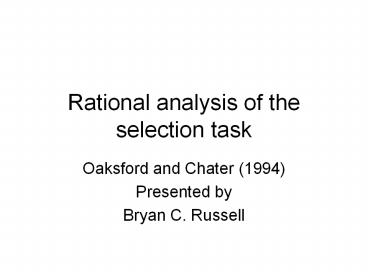Rational analysis of the selection task - PowerPoint PPT Presentation
Title:
Rational analysis of the selection task
Description:
Rational analysis of the selection task. Oaksford and Chater (1994) ... Pretend you are a bouncer at the R&D pub... Actor/inquirer. A guy walks into a bar... – PowerPoint PPT presentation
Number of Views:79
Avg rating:3.0/5.0
Title: Rational analysis of the selection task
1
Rational analysis of the selection task
- Oaksford and Chater (1994)
- Presented by
- Bryan C. Russell
2
Wason selection task
- Rule if there is an A on one side, then there is
a 2 on the other side
K
2
7
A
3
Another view of the task
- Let rule be if p then q
- Four types of cards
- (p,q), (not-p,q), (p,not-q), (not-p,not-q)
- Two hypotheses
- MD p,q are dependent (rule is true)
- MI p,q are independent (rule is false)
4
Assumptions
- We can assign probabilities to the cards
- Should reflect natural statistics of if p then
q statements in nature - P(p MD) P(p MI) a
- P(q not-p,MD) P(q not-p,MI) b
5
Card probabilities
6
Card probabilities
- Task Select card that maximally reduces
hypothesis uncertainty
7
Entropy/uncertainty
8
Entropy/uncertainty
9
Entropy/uncertainty
10
Another experiment
- Suppose you observe
- TTHTHHTHHHHTHHTHTHHT
11
Another experiment
- Suppose you observe
- TTHTHHTHHHHTHHTHTHHT
- HTHHTTHTHHTTTTTTTTTH
12
Another experiment
- Suppose you observe
- TTHTHHTHHHHTHHTHTHHT
- HTHHTTHTHHTTTTTTTTTH
13
Mutual information
14
Application to selection task
a Pr(p)
15
Application to selection task
a Pr(p)
16
Model behavior
17
Observations
- If Pr(q) is low, then choosing p card is
informative - If Pr(p) and Pr(q) is low, then choosing q card
is informative - If Pr(p) is high, then choosing not-q card is
informative - not-p card is not informative (results in zero
information) - P(MI) only scales information values
18
Model behavior
R
19
Rarity assumption
- For selection task, in humans Pr(p) and Pr(q) are
low - Expected information over region R
- choose p 0.76
- choose q 0.20
- choose not-q 0.09
- choose not-p 0
20
How do humans compare?
21
(No Transcript)
22
(No Transcript)
23
Analysis
- Both humans and model accounts for the following
information relationship - choose p gt choose q gt choose not-q gt choose not-p
24
Thematic selection task
- If a person is drinking beer, then they must be
over 20 years old
drinking sprite
25 years old
16 years old
drinking beer
25
Thematic selection task
- If a person is over 20 years old, then they may
drink a beer
drinking sprite
25 years old
16 years old
drinking beer
26
Rule types
- Obligations if action (p), then must condition
(q) - Permissions if condition (p), then may action (q)
27
Subject perspective for permission rule
- Enforcer
- Pretend you are a bouncer at the RD pub
- Actor/inquirer
- A guy walks into a bar
28
Utility-based model
- Focus on rule-use, not rule-testing
- Associate cost with turning over a card
29
Utility-based model
30
Performance of utility-based model
31
Comparison with humans
32
Andersons (1990) steps for rationality
- Specify precisely the goals of the cognitive
system - Develop a formal model of the environment to
which the system is adapted - Make minimal assumptions about computational
limitations
33
Andersons (1990) steps for rationality
- Derive the optimal behavior function given the
previous steps - Examine the empirical evidence to see whether the
predictions of the behavioral function are
confirmed - Rinse, lather, repeat, and refine the theory
34
Discussion questions
- Why use a probabilistic framework for
rationality? - Is the rarity assumption valid?
- Is the selection task representative of
accounting for rational thought? Is it
exhaustive? - How does one learn the utility costs?
- How does one learn Pr(p) and Pr(q)?































